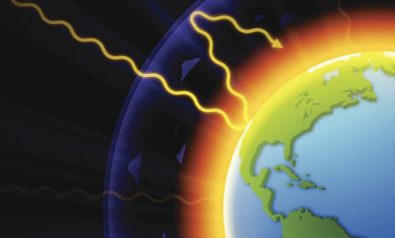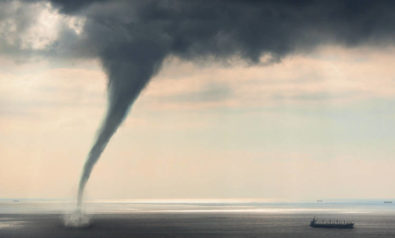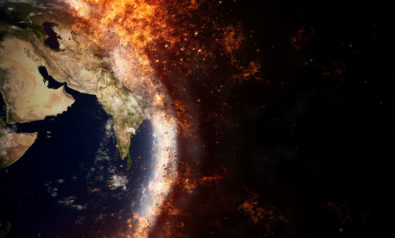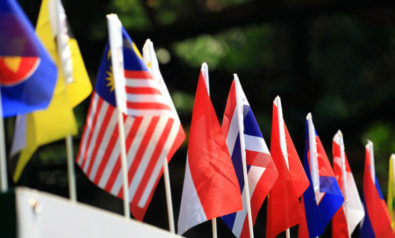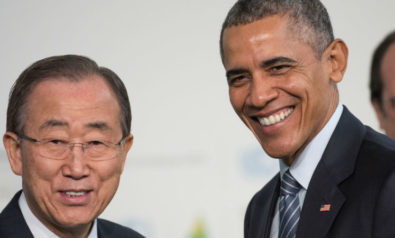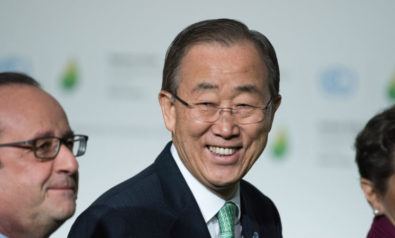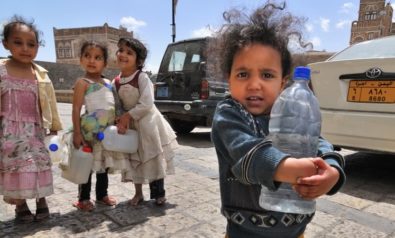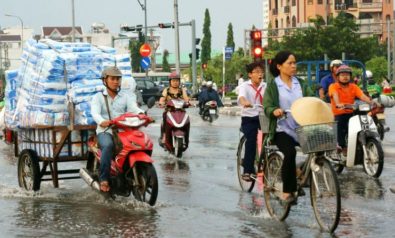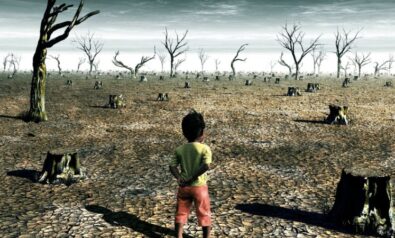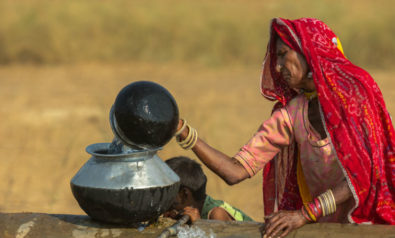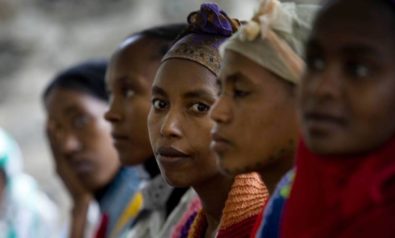Estonia is among Europe’s worst offenders on climate change.
In December 2015, people around the world closely followed the 21st Conference of Parties (COP21) in Paris. The heightened interest was easily understood as so much depended on the talks. For some parties, it was a question of continued economic development that could easily be hindered by prohibitive measures. For others, like the island nation of Fiji, it was a question of survival.
In this light, it was easy to understand the buzz on social media and the close scrutiny by media outlets. Among the rare exceptions was Estonia, where climate change attracts little attention.
Worst Offenders
Under closer examination, this silence is even more surprising, given that Estonia is among the worst offenders on climate change. In the 2016 Climate Change Performance Index (CCPI), Estonia dropped five places and was ranked 51st out of 58 countries. For Estonia, this regression also brought the rating of “very poor” instead of “poor” from 2015, confirming the spot of the lowest performing European Union (EU) country on climate change. Out of all European countries, only Russia scores lower than Estonia.
Naturally, given the country’s small size, it might be difficult to grasp the urgency of the problem. Estonia only accounts for 0.06% of global CO2 emissions, making the impact virtually nonexistent. But in comparison with its gross domestic product (GDP), the problem is much bigger. Estonia accounts for 0.03% of global GDP, meaning that the country is one of four EU members with negative emission efficiency; the other three are Poland, Czech Republic and Bulgaria. But while the latter remain within 10% of more pollution generated than their “fair share,” Estonia is the only one that wastes double the amount of resources to generate the same amount of value.
This record-breaking level of inefficiency alone is something that would deserve an angry response from Estonians who pride themselves on innovation and efficiency. It should be mentioned that in the CCPI study, Estonia is not only less efficient than other members of the European Union and the Organisation for Economic Co-operation and Development (OECD), but it is also the most inefficient country surveyed.
It is easy to understand why people are not rioting in the streets over the issue, but the lack of public debate is surprising as Estonians tend to be vocal and opinionated. What could be the reasons for this deafening silence?
It all comes down to ignorance. Not the harmful, uneducated kind, but perhaps even worse: being ignorant by choice due to lack of will to tackle the problem.
Eurobarometer conducts union-wide polls on public opinion on climate change every five years. The results for Estonia are bad and becoming worse. In 2008, Estonia ranked close to the EU average when answering questions such as, “Do you think you are well-informed or not about 1) the different consequences of climate change 2) the different causes of climate change?” with a little over 50% claiming to be well-informed.
But a difference of attitudes was already palpable with Estonians being the most pessimistic on possible actions. Estonia was the only country with the majority of those polled believing that climate change is an unstoppable process.
A further downturn became evident in the 2013 opinion poll. Estonians were the most likely to pick “tend to disagree” or “totally disagree” to virtually all the questions:
1) Have you personally taken action to fight climate change?
2) Fighting climate change and using energy more efficiently can boost economies and jobs in the EU
3) Reducing fossil fuel imports from outside the EU could benefit the union economically
Again, the highest number of people disagreed with the importance of governmental policies and citizens’ choices such as insulating homes or buying energy-efficient light bulbs, coupled with the lowest or second lowest number of people agreeing with the aforementioned proposals.
Missed Opportunities
In the end, this all comes down to missed opportunities. Estonians like to take pride in the ambitious goals that have been achieved. The examples are numerous—from digital solutions for public services to universal Internet access. On the other hand, when it comes to environmental causes, it is surprising that these nature-loving people seem to have let the train leave the station without even trying to get on it.
According to some estimates, the wind resource alone could cover half of Estonia’s annual electricity consumption, which together with biofuel and solar energy could easily satisfy the nation’s needs. There are also technologies still in the early research phase, such as wave energy that could potentially be well-suited to the Baltic Sea region, where winters bring lower solar productivity and wave power could, therefore, replace that resource during the dark but stormy winters.
The current main source of energy, which is also the main culprit for Estonia’s shameful ratings, could and should be used more effectively. Estonia owes its energy independence to oil shale, called the “burning stone,” which is an oily rock with similar properties to lignite, currently used by Germany and Greece. It is well-known that oil shale can be first transformed into oil rather than directly burning it as coal, meaning higher efficiency and lower carbon emissions. While the alternative method is in place, public and governmental support seems to be low, and Estonia still continues to burn its only fossil resource in the least effective manner.
In Estonia, people like to joke that global warming wouldn’t be too bad. But in reality, the summers would remain cool while winters would become milder, merging with fall, thus creating a prolonged cool, rainy and stormy season—effects that will translate into a loss of economic potential. It is worth mentioning that this constitutes a vicious cycle as a lack of snow and sea ice would eventually translate into a more rapidly increasing sea level.
Waiting for Orders
If this alone will not prove to be motivating enough, the missed opportunity of being a major actor in a “global energy transformation revolution” should, in principle, do the trick. In a similar way, as Estonia is today helping other countries go digital thanks to innovative systems that can also be implemented in big economies, the same pattern could have been followed for green energies.
What is missing is public support, which can only be achieved through debate and discussion. With the lack of media coverage for the biggest, most successful climate conference to date, Estonians have clearly decided to wait for orders rather than take action themselves.
Silvia Lotman, from the Estonian Fund for Nature, noted that Estonia is geographically situated in a lucky place: The first and hardest climate change impacts have not hit us and, at the same time, we have managed to maintain our energy independence due to our own fossil fuel: oil shale. “So it is not [a] very comfortable truth for us that we are causing climate change,” she said. “But I see a lot of hope for change after [the] Paris COP, as many journalists and opinion leaders have turned to environmentalists with questions of how to turn the global agreement to our opportunity. I really hope that this way of thinking will start growing now in Estonia.”
Ojars Balcers, from Latvia’s Fund for Nature, agreed that involvement of the public is very important as it is the only way to advance to the 21st century economy of production and innovation. Nevertheless, the importance of EU cooperation cannot be understated in order to guarantee energy independence for the union. Balcers also reminded us that whereas ambitious goals are important, we should already reach for the low-hanging fruit—a discussion about natural resource productivity and the efficiency of energy use, heat and power losses, and their role in reducing our external energy dependency. Perhaps we simply need to explain it intelligently.
Last December, a final agreement on climate policy was announced at COP21. As Balcers pointed out, the driver’s seat to the 21st century green economy is empty, and Estonia could make a good candidate fill it. With the cards played right, this could turn out to be an excellent boost to the economy due to improved efficiency and further need of developing and improving new technologies. Co-investing in green energy projects such as windmills can put people to work together, as the Germans were mobilized with the Energiewende project, therefore, strengthening communities and further advancing civil society.
The idea of leaving a slightly better world to for the next generation isn’t too bad of an idea either.
*[An earlier version of this article was originally published by Estonian World.]
The views expressed in this article are the author’s own and do not necessarily reflect Fair Observer’s editorial policy.
Photo Credit: Alex Mit / Adminrz / Shutterstock.com
 We bring you perspectives from around the world. Help us to inform and educate. Your donation is tax-deductible. Join over 400 people to become a donor or you could choose to be a sponsor.
We bring you perspectives from around the world. Help us to inform and educate. Your donation is tax-deductible. Join over 400 people to become a donor or you could choose to be a sponsor.
Support Fair Observer
We rely on your support for our independence, diversity and quality.
For more than 10 years, Fair Observer has been free, fair and independent. No billionaire owns us, no advertisers control us. We are a reader-supported nonprofit. Unlike many other publications, we keep our content free for readers regardless of where they live or whether they can afford to pay. We have no paywalls and no ads.
In the post-truth era of fake news, echo chambers and filter bubbles, we publish a plurality of perspectives from around the world. Anyone can publish with us, but everyone goes through a rigorous editorial process. So, you get fact-checked, well-reasoned content instead of noise.
We publish 2,500+ voices from 90+ countries. We also conduct education and training programs
on subjects ranging from digital media and journalism to writing and critical thinking. This
doesn’t come cheap. Servers, editors, trainers and web developers cost
money.
Please consider supporting us on a regular basis as a recurring donor or a
sustaining member.
Will you support FO’s journalism?
We rely on your support for our independence, diversity and quality.




